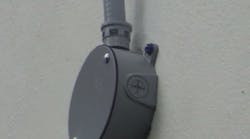Q. Does the Code require bonding around raceway knockouts for 120V, 208V, or 240V feeders and branch circuits?
A. You must bond all metal parts intended to serve as the effective ground-fault current path, such as raceways, cables, equipment, and enclosures, together to ensure they have the capacity to safely conduct any fault current likely to be imposed on them [250.96(A)]. If the knockouts are damaged, the integrity of the fault current path is jeopardized, and you must then bond around them. If the knockouts are not damaged, no extra bonding is required.



